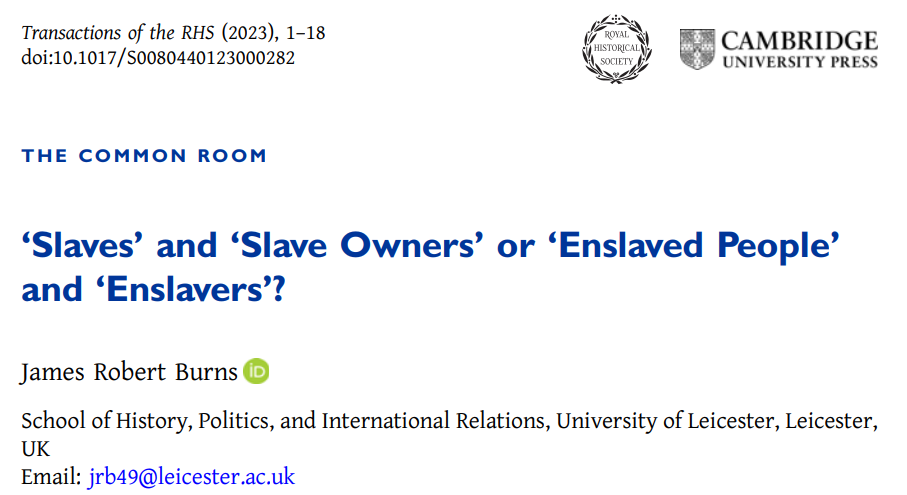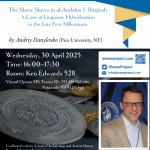Strengths and Weaknesses of the Term ‘Enslaved People’
- Erin Thomas Dailey
- 17 November 2023

The new article in Transactions of the Royal Historical Society (copyright: Cambridge University Press).
By James Burns
I have published an article in Transactions of Royal Historical Society on the growing trend of referring to ‘enslaved persons’ and ‘enslavers’ rather than ‘slaves’ and ‘slave owners’. You can read the FirstView version of the article here.
Although I conclude that ‘enslaved person’ is unconvincing as a universal substitute for ‘slave’, it does have value.
Here, then, are some of the arguments for using ‘enslaved people’ and ‘enslaver’:
- These terms recognise that slave owners constantly reimposed unfree status on their slaves (at the most tangible extreme, through capturing and punishing fugitives), and created that status for children born to slaves;
- Defining people as ‘slaves’ was part of the construction and legitimatisation of slavery; consequently, the term has had dehumanising connotations.
- On a more general level, rethinking our terms can encourage us to rethink our assumptions. This could be a particularly important process for historians of Late Antiquity, given that we are almost entirely reliant on sources written by a slaveholding elite.
Nonetheless, I do think that making ‘enslaved person’ and ‘enslaver’ our standard terms of analysis would not be as transformative nor as beneficial as their proponents claim, because:
- There are good reasons for maintaining the conceptual distance between slaveholding and enslavement. Slave owners used strategies of enslavement, but other relevant dynamics include manumission and ownership. And some slaves may have attached a special significance to enslavement as the initial act by which someone was severed from their freedom and family;
- Though there was some practical and theoretical overlap between enslavers and slave owners, this means that ‘enslaver’ can actually perpetuate the self-image of certain slaveholders as much as ‘master’; for Roman generals and early medieval warlords, enslaving people was a source of pride. Moreover, we should be very careful about assuming that ‘enslaved person’ brings us inherently closer to ‘the perspective of the unfree’, given the diversity of both slaves and owners;
- While ‘enslaved person’ intuitively implies that someone did not choose or accept their enslavement, we know that many people in the early middle ages sold themselves into slavery. As Alice Rio shows, these people had a surprising capacity to negotiate terms of service; they were not ‘passive victims’. The term ‘slave’ is useful precisely because it does not go into the specific origins of a person’s unfree status.
Scholars can reasonably attach different degrees of importance to each of these advantages and disadvantages, and, indeed, any other relevant concerns not mentioned above. It is my hope that my article stimulates a productive debate among academics, so that historians are no longer inclined to use one term or the other without justification or explanation.
Ultimately, understanding the personhood of the unfree is an ethical imperative regardless of which term we prefer. But, having reflected on this a bit more since finalising my article for TRHS, I think it is important to note that recognitions of the humanity of the enslaved — or, at least, recognitions of the moral worthiness of slaves as people who could enter Heaven — did not stop Late Antique Christian elites practicing slavery. As historians, we can only strive to ensure that the substance of our analysis is not too far compromised by the limitations of terminology in conveying the complex horrors of unfreedom.




